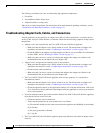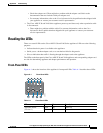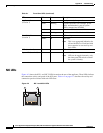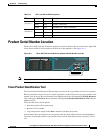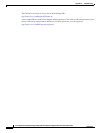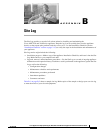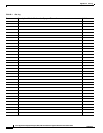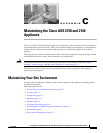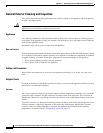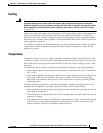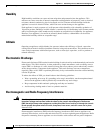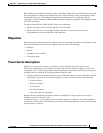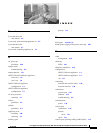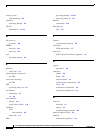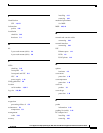
C-2
Cisco Application Deployment Engine (ADE) 2130 and 2140 Series Appliance Hardware Installation Guide
78-18579-02
Appendix C Maintaining the Cisco ADE 2130 and 2140 Appliance
Maintaining Your Site Environment
General Exterior Cleaning and Inspection
This section details the cleaning requirements for exterior surfaces of the appliance and the inspection
of cables and adapter cards.
Caution Never spray cleaning solution on the surfaces of the appliance. Overspray can penetrate into the
appliance and cause electrical problems and corrosion.
Appliance
Use a lint-free, nonabrasive cloth to perform cleaning. Do not use a solvent, abrasive cleaning agents, or
tissue paper. If the appliance is dirty (for example, with thick dust), use a soft damp cloth and wipe the
surface of the appliance gently.
Immediately wipe off any water or liquid from the appliance.
Dust and Particles
A clean operating environment can greatly reduce the negative effects of dust and other particles, which
act as insulators and interfere with the operation of an appliance’s mechanical components. In addition
to regular cleaning, you should follow these guidelines to deter contamination of the appliance:
• Do not permit smoking anywhere near the appliance.
• Do not permit food or drink near the appliance.
Cables and Connectors
Inspect cables and connectors to and from your appliance periodically to see if they are worn out or
loose.
Adapter Cards
Check the connections on the adapter cards. Be sure they are secured to the appliance and have not been
jarred loose or mechanically damaged.
Corrosion
The oil from a person’s fingers or prolonged exposure to high temperature or humidity can corrode the
gold-plated edge connectors and pin connectors on adapter cards in the appliance. This corrosion on
adapter card connectors is a gradual process that can eventually lead to intermittent failures of electrical
circuits.
To prevent corrosion, you should avoid touching contacts on adapter cards. Protecting the appliance from
corrosive elements is especially important in moist and salty environments, which tend to promote
corrosion. Also, as a further deterrent to corrosion, the appliance should not be used in extreme
temperatures, as explained in the “Temperature” section on page C-3.



